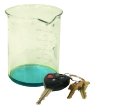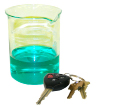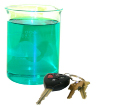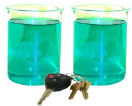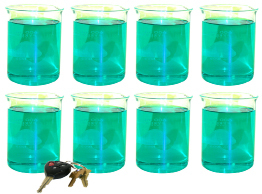Module 2
1. Module 2
1.14. Page 4
Module 2: The Imperial System
Bringing Ideas Together
cubic foot (ft3): a unit of volume in the imperial system
A cubic foot is the volume of a cube having an edge length of 1 ft.
cubic inch (in3): a unit of volume in the imperial system
A cubic inch is the volume of a cube having an edge length of 1 in.
cubic yard (yd3): a unit of volume in the imperial system
A cubic yard is the volume of a cube having an edge length of 1 yd.
In the Explore you calculated the volume of your bedroom in cubic feet. The following cube is 1 cubic foot.

A basketball is almost 10 in in diameter. How many inches are in 1 ft?
There are two other common units: the cubic inch and the cubic yard. Cubes representing these units of volume are shown in the diagram.
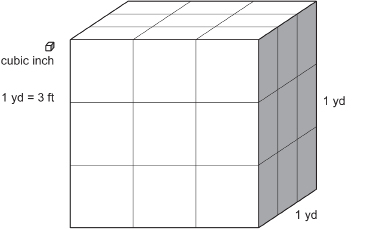
As you discovered in Explore, if the dimensions of a rectangular box are increased by a factor of 3, the volume of the larger box is 3 × 3 × 3, or 27 times, as much as before.
So, it’s not surprising that 1 yd3, as a volume, is 27 times as much as 1 ft3.
You can also see this relation between cubic yards and cubic feet by applying the formula ![]() to the same cube—once using measurements in yards and once using measurements in feet.
to the same cube—once using measurements in yards and once using measurements in feet.
![]()
and
![]()
So, 1 yd3 = 27 ft3.
Garden oil, concrete, sand, and gravel are often sold by the cubic yard.
The Cubic Foot
The cube represents the volume of 1 ft3. The cube faces have grid lines separated by 1 in. The grid lines can help you figure out how many cubic inches are in 1 ft3.
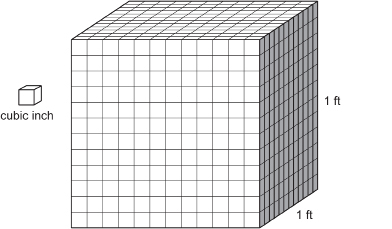
How many cubic inches are there in a cubic foot?
There is another way to understand how many cubic inches there are in a cubic foot. Going from 1 in3 to 1 ft3 you are increasing each of the three dimensions by a factor of 12. Therefore, the volume will increase by 12 × 12 × 12. So, the volume will increase by a factor of 1728.
In terms of volume, 1 ft3 is certainly much larger than 1 in3.
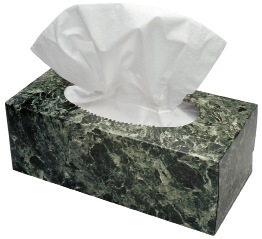
Stockbyte/Thinkstock
Example 3
A tissue box is 5 in wide, 9 in long, and 3 in high.
- What is the volume of the box in cubic inches?
- What is the volume of the box in cubic feet?
Express your answer as a fraction or decimal value. If using a decimal value, round your answer to 2 decimal places.
Solution

The volume of the tissue box is 135 in3.
- Method 1
Change each dimension to feet first, since the answer is required in cubic feet.

Now find the volume. Because the dimensions are in feet, your answer will be in cubic feet.
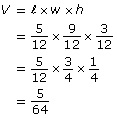
The volume is ft3.
ft3.
To express the volume in decimal form, you could continue this way.

On your calculator, press


To round to 2 decimal places, look at the third decimal place. If the digit is 5 or more, round up!
The volume is 0.08 ft3.
Method 2
Convert cubic inches to cubic feet directly, since the volume is already calculated in cubic inches.
1 ft3 = 1728 in3
So,

The volume is ft3.
ft3.
To express the volume in decimal form, you could continue in the following way.
On your calculator, press


To round to 2 decimal places, look at the third decimal place. If the digit is 5 or more, round up!
To check if 0.08 ft3 is reasonable, estimate ![]() using compatible numbers.
using compatible numbers.
Round 1728 to 2000.
Round 135 to 140. Do you agree 14 and 2 are compatible numbers?
The volume is 0.08 ft3.
Example 4
Chuck ordered 4 yd3 of soil to raise the level of the flower beds along his house. How many cubic feet of soil did Chuck order?
Solution
Because 1 yd3 = 3 ft × 3 ft × 3 ft = 27 ft3,
![]()
Try using “Imperial System Volume Conversion” to check the unit conversions in the previous examples.
 Self-Check
Self-Check
Respond to the following questions. When you are finished, check your answers using “Imperial System Volume Conversion,” the conversion tool you used to check the Example answers.
Did You Know?
With 1183 horsepower, the SSC Ultimate Aero TT is the world’s most powerful car.
SC 2. Connie is interested in classic cars. At a recent auto show, she saw a 1981 Ford Mustang 4.6 on display. The engine displacement was given as 281 in3. She was told that was the same as saying the car had a 4.6-L engine. What is the engine displacement in cubic feet?
Round your answer to 2 decimal places.
SC 3. A cardboard box is 24 in long, 18 in wide, and 18 in high.
- What is the volume of the box in cubic feet?
- What is the volume of the box in cubic yards?
SC 4. Give an example of an everyday object that has each of the following volumes.
- 1 in3
- 1 ft3
- 1 yd3
SC 5. Six inches of fresh snow fell on Blaine’s driveway, which is 60 ft long and 18 ft wide.
- How many cubic feet of snow must Blaine move to clear his driveway?
- How many cubic yards of snow must Blaine move to clear his driveway?
Units of Capacity
Do you remember the units commonly used in the metric system for capacity? What are they?
The imperial units of capacity include the fluid ounce, cup, pint, quart, and gallon. There are ![]() cups in a pint, 2 pints in a quart, and 4 quarts in a gallon.
cups in a pint, 2 pints in a quart, and 4 quarts in a gallon.
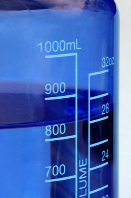
© Geoffrey Kuchera/shutterstock
pint (pt): a measure of capacity in the imperial system
A pint is roughly equal to 0.5 L.
quart (qt): a measure of capacity in the imperial system
There are 2 pt in a quart.
A quart is approximately equal to 1 L.
gallon (gal): a measure of capacity in the imperial system
A gallon is 4 qt in size.
|
1 fluid ounce |
1 cup = 8 fluid ounces |
|
1 pint = |
1 quart = 2 pints |
|
1 gallon = 4 quarts |
|
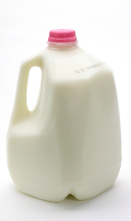
© Elena Ray/shutterstock
An imperial quart is slightly larger than a litre. An imperial quart is 1.14 L.
In the United States, milk and juice are commonly sold in gallon, quart, and pint containers. Americans buy gasoline by the gallon.
Did You Know?
Milk in Ontario is also sold in bags, not just jugs or rigid containers.
However, these United States’ measures are different from what they are in Canada. The American quart and gallon are only ![]() as large as their Canadian imperial equivalents.
as large as their Canadian imperial equivalents.
Inconsistencies such as these are good reasons to use metric units to quote volumes and capacities!
If you have done a little baking, you have probably encountered the cup and the fluid ounce in older recipes. There are 160 fluid ounces in an imperial gallon and 40 fluid ounces in an imperial quart. You may see ounces on imported goods.
The word gallon comes from the Latin word galleta. Galleta is the Latin word for pail. A four-litre pail of ice cream holds about one gallon.
Example 5
René’s cousin in Seattle is painting the bedrooms in his home. He calculated that he needs enough paint to cover 900 ft2. How many gallons should he buy if 1 qt covers 75 ft2?
Solution
1 gal = 4 qt
1 qt of paint covers 75 ft2.
So, 1 gal covers 4 × 75 ft2 = 300 ft2.
![]()
René’s cousin needs to buy 3 gal of paint.
Example 6
Marlene bought 1 gal of orange juice while travelling in Montana.
- How many cups of juice are there in Marlene’s gallon of juice?
- If one serving of juice is one-third of a cup, how many servings are there in Marlene’s gallon of juice?
Solution
- 1 gal = 4 qt
1 qt = 2 pt
So, there are 4 × 2 = 8 pt in 1 gal.
1 pt = 2 c
So, there are 8 × 2 = 16 c of juice in 1 gal.
- 1 c = 3 servings

There are 48 servings of juice.
 Self-Check
Self-Check
Try the following questions.
SC 6. When travelling in North Dakota, Mary bought a gallon of milk for $3.00. How many quarts are in 1 gal? Calculate how much each quart cost.
SC 7. Bill wants to paint the exterior of his garage door. The garage door measures 16 ft × 7 ft. He has 2 qt of paint left in a gallon container he purchased earlier. Will Bill have enough paint for this project if the directions on the gallon container say the container holds enough paint to cover 250 ft2?
Imperial and American Standard Measures of Capacity
As for length and area, tables may be used to convert between metric measures and volume measures, such as cubic inches, cubic feet, cubic yards, quarts, and gallons. However, the situation for volume is complicated by the fact that, in the United States, the units for capacity (such as quarts and gallons) are not the same as the imperial equivalents. The American gallon is very close to 4 L, but the imperial gallon is 20% larger. This creates confusion when talking about fuel consumption, for instance. Twenty miles per gallon does not mean the same thing in Canada as it does in the United States.
Did You Know?
Canada is the largest provider of oil and natural gas for the United States.
Before looking at the conversion tables for metric, imperial, and American Standard measures, work through the following example to see how entries in the tables are obtained.
Example 7
How many cubic centimetres are there in 1 in3?
Solution
Remember that 1 in = 2.54 cm.
So,

There are exactly 16.387 064 cm3 in 1 in3.
Look at the following conversion tables. The entries have been rounded.
|
Metric |
Imperial (Canadian) |
American Standard Measures |
|
1 cm3 |
0.0610 in3 |
0.0610 in3 |
|
1 m3 |
1.3080 yd3 |
1.3080 yd3 |
|
1 m3 |
35.3147 ft3 |
35.3147 ft3 |
|
1 L |
0.2200 gal |
0.2642 gal (US) |
|
1 L |
0.88 qt |
1.0567 qt (US) |
|
Imperial |
American Standard Measures |
Metric |
|
1 in3 |
1 in3 |
16.3871 cm3 |
|
1 ft3 |
1 ft3 |
0.0283 m3 |
|
1 yd3 |
1 yd3 |
0.7646 m3 |
|
1 qt |
1.2010 qt (US) |
1.1366 L |
|
1 gal |
1.2010 gal (US) |
4.5465 L |
|
American Standard Measures |
Imperial |
Metric |
|
1 qt (US) |
0.8327 qt |
0.9462 L |
|
1 gal (US) |
0.8327 gal |
3.7854 L |
Work through the following examples to see how to use these tables.
Example 8
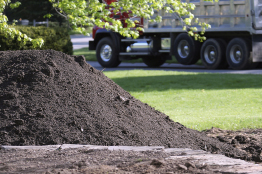
iStockphoto/Thinkstock
Bernice is ordering topsoil for her garden. She calculated she needs 15 yd3. When she telephones in her order, how many cubic metres should she ask for? Round your answer to 1 decimal place.
Solution
![]()
So,

Bernice should order 11.5 m3 of topsoil.
Example 9
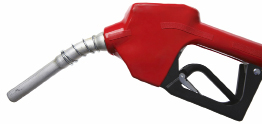
iStockphoto/Thinkstock
A compact car in the United States is advertised as averaging 32 mi/gal. How many miles to the imperial gallon would the car average?
Solution
A Canadian gallon is larger than a US gallon.
1 gal (imp) = 1.2010 gal (US)
So, the car would go 1.2010 farther on an imperial gallon.
1.2010 × 32 mi = 38.432 mi
On an imperial gallon, the mileage would be 38.432 mi/gal.
 Self-Check
Self-Check
Try the following questions.
SC 8. How many litres of paint are there in 5 gal (imp)?
SC 9. Bill bought 3 qt of milk in Montana, US. How many litres of milk did Bill buy?
SC 10. If gasoline sells for $0.936 per litre, how much is it per imperial gallon? Round your answer to the nearest cent.
SC 11. How many cubic feet are there in a load of concrete 2 m3? Round your answer to 1 decimal place.
 Mastering Concepts
Mastering Concepts
Aaron wants to order enough topsoil to raise a rectangular flower bed 8 in. If the flower bed measures 21 ft × 3 ft, how many cubic yards of topsoil should he order if the landscape firm sells soil to the nearest one-half cubic yard? Make sure Aaron is not short on topsoil!
![]()
So, 0.08 is a reasonable answer.
You can count the number of cubic inches making up the cubic foot. Clearly, the top layer contains 144 cubic inches. There are 12 layers. So, there are 12 × 144 in3 in all.
So, there are 1728 in3 in a cubic foot.
You can also calculate the number of cubic inches using the formula ![]() .
.

